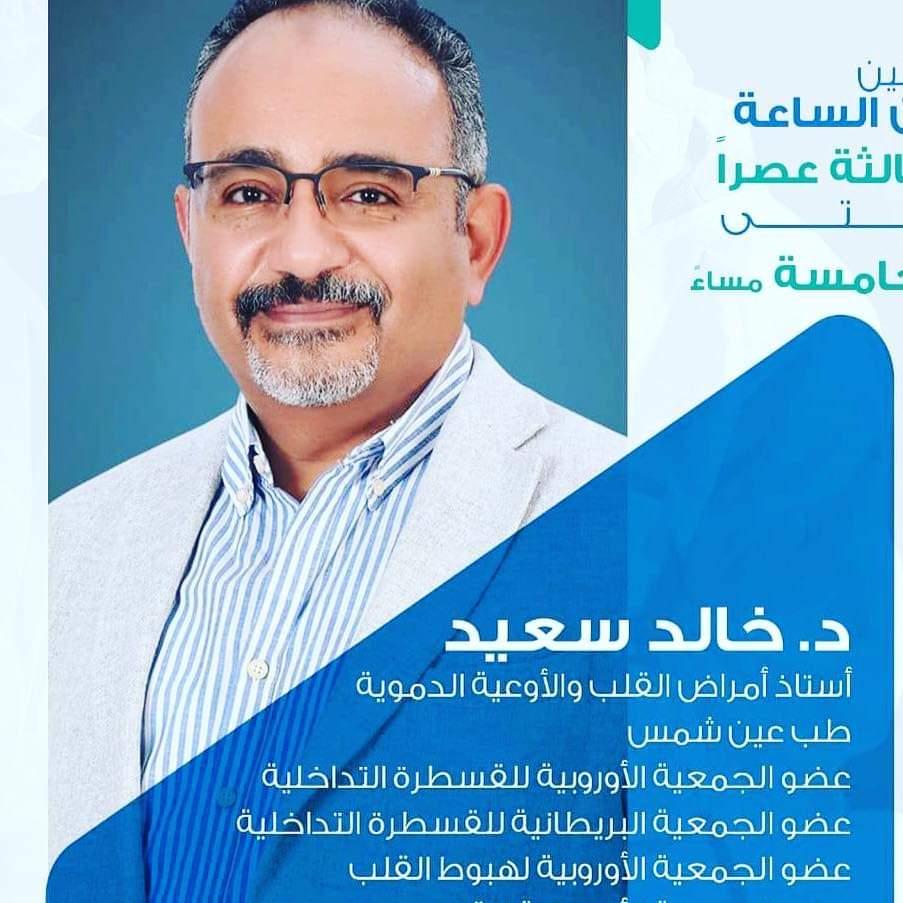About Me...
Dr. Khaled Said
Professor of Cardiology and Vascular Diseases
🎓 Academic Qualifications:
Professor of Cardiology and Vascular Diseases - Ain Shams University Faculty of Medicine
Member of several international medical associations:
European Society of Cardiology
European Society of Interventional Cardiology
British Society of Interventional Cardiology
American Heart Association
European Heart Failure Association
Egyptian Society of Cardiology
🩺 Medical Specialties and Services Provided:
1. Coronary Artery Diseases:
💔 Angina Pectoris: Treatment of chest pain caused by reduced blood flow to the heart.
🩸 Coronary Artery Disease: Treatment of blocked or narrowed blood vessels supplying the heart (using stents or catheterization).
🔧 Coronary Artery Insufficiency Treatment: Using stents or catheterization to improve blood flow in blocked arteries.
2. Blood Pressure Issues:
📉 Hypertension: Elevated blood pressure that can lead to heart problems.
💨 Pulmonary Hypertension: High pressure in the pulmonary vessels, which affects heart health.
3. Heart Valve Diseases:
⚙️ Diagnosis and Treatment of Valve Diseases: Such as valve leakage or narrowing.
🔩 Valve Dilation with Interventional Catheterization: A non-surgical alternative.
4. Heart Rhythm Disorders:
⚡ Arrhythmias: Such as atrial fibrillation or tachycardia.
💨 Exercise Stress Test (ECG): A heart test during exercise to assess its endurance.
📈 Holter ECG Monitoring: Continuous 24-hour heart activity monitoring.
5. Echocardiography and Diagnostic Studies:
🔬 Echocardiogram: Ultrasound examination of the heart to assess its function and valves.
📉 Normal ECG: To detect electrical disturbances in the heart.
6. Heart Failure Treatment:
🫀 Diagnosis and treatment for cases where the heart is unable to pump blood effectively.
7. Women's Heart Disease Treatment:
👩🦰 Diagnosis and Treatment of Heart Diseases: That may affect women differently, such as heart conditions during pregnancy or hormonal changes.
8. Rheumatic Heart Disease Treatment:
🦠 Monitoring of Rheumatic Activity: In cases of rheumatic fever or autoimmune heart diseases.
9. Post-Procedure Care:
🩺 Monitoring after Stent Insertion: Or coronary dilation using catheterization.
🏥 Cardiac Rehabilitation: After heart surgery or any medical procedures.
10. Interventional Catheterization:
⚙️ Traditional Coronary Catheterization: Or from the hand - a less invasive, quicker recovery method.
11. Intensive Care:
💉 Specialized Care for critical heart and chest conditions.
12. Heart Stents:
🩸 Inserting Stents to improve blood flow in damaged or blocked arteries.
13. Pediatric Cardiology:
👶 Specialized Medical Services: For diagnosing and treating children's heart diseases.
14. Adult Cardiology:
🧑⚕️ Comprehensive Treatment: For heart diseases affecting adults of all ages.
📍 Clinic Address:
City of Nasr:
79B, Nasr Street, Entrance 2, Second Floor - Third building after Taiba Mall.
Fifth Settlement:
264 North 90th Street, Doctor's Center 2, above Hagar Pharmacy, Third Floor, Clinic 10.
📞 Clinic Phone Number:
01152213190
💡 Additional Tips:
🌱 Importance of Prevention: "Prevention is better than cure," so it's recommended to undergo regular heart checkups to avoid serious cardiovascular complications.
🏃♂️ Healthy Lifestyle: Regular exercise and a healthy diet are key to preventing heart diseases.
For appointments or inquiries, feel free to contact the clinic directly or visit.

